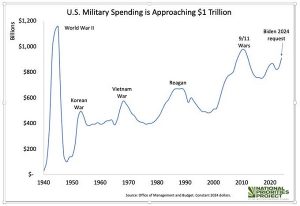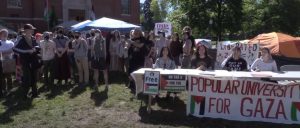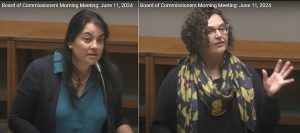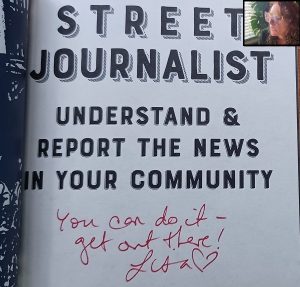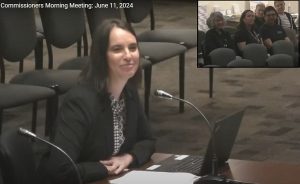UO protesters cancel ‘cheerleader for the left’
12 min read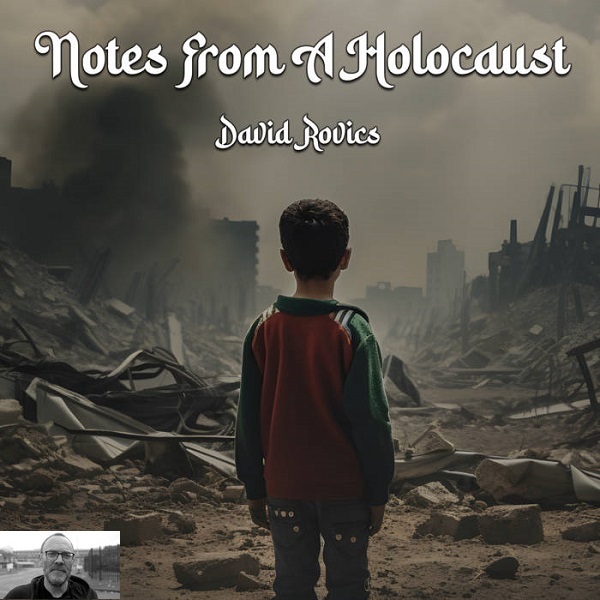
This Week with David Rovics is broadcast every Tuesday at 8 p.m. on KEPW 97.3 FM. His May 6 essay “A cheerleader without a team” describes being disinvited to perform at the University of Oregon pro-Palestine camp. During his shorter-than-expected visit to Eugene, he was interviewed by KEPW’s David Zupan.
David Rovics (This Week With David Rovics, May 7): A cheerleader without a team. One more chapter in the tragic story of the League of Cancelled Cheerleaders.
[00:00:11] I don’t remember when I first heard of or thought of the term cheerleader for the left, but that’s what I always used to say I was when people would ask what I did. Sometimes people would seem perplexed. They’d see me singing at some anarchist event or some communist event, they’d get the impression that I was some kind of professional, and they’d wonder how I possibly made a living as a musician in the context of this or that group.
[00:00:34] Was I a member of this group? Depending on the group, the answer was usually no. Then what was I doing singing at their event? I’m a cheerleader for the left, I’d explain. If there are people trying to shake things up in one way or another, whether they’re doing civil disobedience to try to stop a pipeline, or having a protest rally against an imperial war, or trespassing onto the floor of an arms factory to smash up the equipment, or just having a conference in a lecture hall, or any number of other initiatives, I’ll write songs about the fine things they’re doing and sing them at their events.
[00:01:07] My model for this career, such as it was, was Pete Seeger. I always thought of myself as probably having more militant politics than Pete, but the ecumenical way he did things was inspiring for me. I had wanted to follow in Pete’s footsteps by being an ecumenical cheerleader for the left across the U.S. and elsewhere, for popular struggles, for the labor and environmental and peace movements, and I did just that with the aid of the student groups and the college gig economy.
[00:01:36] I had been making a habit of doing at least one, sometimes two, full-on driving tours around the country per year, where I’d go by car, stopping every few hours in a different town to do one or more gigs there, and I’d cover 25 states that way on a typical tour.
[00:01:52] The only parts of the country where I’d usually be driving more than a few hours between gigs would be the Dakotas or Nebraska. Otherwise, the gigs were everywhere, where there were colleges, and there were thousands of colleges in the United States.
[00:02:04] The year before I actually moved to Oregon, I remember as being a typical visit to this state. In the course of a week or so, I played concerts for students at Reed, at Lewis and Clark, at PSU, at some little Portland branch of the University of Oregon, along with the bigger campus in Eugene, and at the big university in Ashland as well. And that’s not including the other gigs I did just over the river in Vancouver, Washington, and all over the state of Washington.
[00:02:31] I kept at the task of being a cheerleader for the left even when the college gig economy collapsed. I became a cheerleader for the left mainly on the internet, and in some countries in Europe, where touring still works financially. I miss the cheerleader of the left role that I once had all over the U.S., and I continually try to revive my role in that regard, only to get swatted back down in one way or another when it comes to efforts here in Oregon.
[00:02:57] When the campus occupations started happening all over the country, I once again thought, and still do, that I should be going to those locations and being a cheerleader of the movement. I have, after all, put out two albums in the past few months that are all or mostly about the genocide in Gaza.
[00:03:14] There are actually millions of people who have heard some of these songs, as some of them are being shared widely online, in the Middle East in particular, where I’ve been a guest fairly regularly on Arabic-language TV stations, and I’m receiving daily messages of praise for my songs from that part of the world, as well as from around the U.S.
[00:03:32] I got one such message from a student at a campus in the state of Washington who was in touch with students in Eugene at the University of Oregon who were putting together cultural activities and looking for more musicians to sing there.
[00:03:44] Given that I have a lot of songs on the subject, I am a fairly obvious person to be part of such a program and I was happy to volunteer to participate, although Eugene is a 100-mile drive to the south of Portland.
[00:03:58] I am always especially glad to get invitations to sing at occupations or encampments, having sung at hundreds of them around the world, whether it’s people occupying a factory, occupying a coal mine, occupying a building, keeping a picket line moving, barricading a road, or doing a public encampment like a lot of what’s happening on the campuses lately. One thing these sorts of endeavors always have in common is they involve a lot of people spending inordinate amounts of time in one place.
[00:04:24] From the perspective of a performer, they tend to make great audiences, because they desperately need more things to do, generally—spending most of your time doing nothing, or not much, possibly being very bored, and then you spend a small amount of your time involved with some kind of often terrifying confrontation with police or counter-protesters.
[00:04:44] But during the time that you’re not involved with such confrontations, people need things to do, and entertainment. Also, occupations in public places are great opportunities for doing public popular education, and for putting on public programs involving musicians and speakers who can do a good job of amplifying the message of the occupation in so many ways.
[00:05:04] It felt good to be going to Eugene. I had plans in addition to singing on the campus: Lunch with an old friend who I knew from the East Coast, who I hadn’t seen in 30 years. An interview for the local community radio station with a longtime activist who’s lived in Eugene ever since I can remember Eugene.
[00:05:23] After having lunch with my friend just north of Eugene I got back into my car preparing to head to the U of O campus to set up and play for the encampment there. I habitually check my email inbox far too often, and I did it in the car, before heading into town, to find this message:
[00:05:41] ‘Some people in jvp (Jewish Voice for Peace) brought up some concerns about associations with a white supremacist, and Steering Committee has decided it would be best if you didn’t perform. I apologize for letting you know so late, especially if you are already on your way. There were some miscommunications and I thought someone else had contacted you. Thank you again for offering to perform, and sorry it had to be cancelled.’
[00:06:07] A cheerleader without a team to sing for. Instead of going to the campus, I visited my friend and longtime videographer for the left, Todd Boyle, who was going to film my concert. I did the interview at KEPW with David Zupan…
[00:06:23] David Zupan: This is David Zupan on KEPW 97.3 FM PeaceWorks Community Radio and today we’re here interviewing David Rovics. Many of you know he’s the legendary political folk singer who’s down here from Portland, and we welcome him to the studio.
[00:06:46] David Rovics: Thank you, David. Glad to be here.
[00:06:49] David Zupan: As far as what happened today, weren’t you scheduled to perform at the U of O?
[00:06:58] David Rovics: Yep. I was invited to participate in their cultural program at the encampment at the U of O and then disinvited after I had driven down to Eugene and was charging my car and checked my email and I had been disinvited.
[00:07:15] And it’s not the first time that that sort of thing has happened. But I had been in the habit of telling anybody organizing a gig for me, like: Well, as soon as you associate with me publicly and mention anything about me, you know, even if it’s just to say, ‘Oh, I like this guy’s music’ or, you know, ‘Check out this album’ or whatever, somebody’s going to write you and say, you know, ‘Don’t you know? That guy’s a Nazi,’ you know.
[00:07:43] So if you’re going to host a gig for me, you got to be prepared for that. And you know, so I would, I, for years I’ve been telling people like if you’re organizing a gig for me, be, you know, be prepared for that.
[00:07:58] But I had been recently getting the impression that the people were generally starting to see past this kind of nonsense of like getting some random email from somebody or message from some platform from somebody you don’t know who’s telling you that ‘This guy’s a Nazi.’ You know, I was under the impression that people are getting a little more savvy about that kind of thing, but that appears not to be the case with the particular folks involved with this encampment who were in touch with me anyway.
[00:08:32] David Zupan: That’s unfortunate. I wonder what’s your overall impression of the student protests on the campuses and you mentioned earlier that you saw it’s evolved in a way that’s positive.
[00:08:52] David Rovics: It’s positive that there are these encampments happening and that there are people who are trying to oppose the genocide of the people in Gaza that is being carried out by Israel right now. I mean, any kind of, anybody highlighting that, anybody protesting about that, and I mean, that’s a good thing ’cause it needs to be stopped somehow.
[00:09:14] But, you know, what is also evident to people who are kind of paying attention is the solidarity with the folks in Gaza and the protests that have been going on in many other countries have been so much bigger and so much more constant than what’s been happening in the United States.
[00:09:41] With some exceptions, occasionally in some cities where there’s been bigger protests in the U.S., but generally like the scale of what you see happening in places like England or Sweden or to say nothing of countries like Yemen or Jordan or Algeria or Indonesia.
[00:10:01] I mean, it’s just like, you know, the entirety of society pours out into the streets, you know, the kinds of protests that we also saw, you know, to a lesser extent during the invasion of Iraq in, you know, in this country as well—really, really, big, big crowds. And that’s not been happening in the United States.
[00:10:20] And there’s a lot of reasons for that, but one of them is the way that the left has in recent decades become so mired in identity politics and fear and suspicion and this kind of idea that if you’re not from the right particular group that is relevant to a particular question, then you really shouldn’t have an opinion on it.
[00:10:49] And rather than the opposite of that sentiment, which is what we need for really good solid heuristic organizing, we need to be thinking in terms of: How can we bring together everybody who is opposed to genocide, regardless of their background or their religious background or political orientation? We need everybody in on this, you know, and you know, that’s the opposite of the sort of identity politics kind of orientation.
[00:11:18] David Zupan: And it probably hasn’t helped that the folks who are opposed to stopping the carnage in Gaza are working very hard to paint the protest movement as antisemitic.
[00:11:40] David Rovics: You would think that it would be advantageous that in terms of the whole identity politics reality in this country that this movement is led by Jews. And that’s evident to anybody involved with it anywhere, I think.
[00:11:58] But you know certainly from what I’ve observed in various parts of the country since last October (to say nothing of the Second Intifada when you also had a very significant Palestine solidarity movement in this country around 2000, you know, the year 2000, around that time, early 2001 in particular), it’s Jews who are much more likely in this country where we do have a significant Jewish population and it’s a small minority, but it’s significant, in terms of the Jewish population in the world, it’s very significant in the United States, particularly in the Northeast, and the Palestine solidarity movement in this country, since I’ve been aware of it, has been very much disproportionately Jewish. And there’s a lot of reasons for that, but regardless of the reasons for it, you would think that it would help in terms of the accusations of antisemitism, because you would think that accusing Jews of antisemitism seems a bit odd, but it is now a very common accusation to make.
[00:13:09] It’s very strange, because like when I was younger, sometimes they’d say I was ‘a self-loathing Jew,’ but they wouldn’t call Jews antisemites. Now they do, all the time. And in Germany too, Holocaust survivors even, you know, who are critical of Israel, you know, you got, you know, the young blonde anti-Deutsch, you know, having the hubris to call them antisemites, you know, and they’re just shocked that these people can’t believe they’re being called antisemites by these Germans, you know, when they actually are, you know, literally, Holocaust survivors in that country.
[00:13:45] David Zupan: Down here from Portland, David Rovics here on KEPW 97.3 FM PeaceWorks Community Radio.
[00:13:54] David Rovics (This Week With David Rovics, May 7): …I did the interview at KEPW with David Zupan and I got back in the car to make the 100-mile drive back to Portland. I received a Google alert that my name had appeared in the Daily Emerald, what used to be the student paper, with an update about goings on during week two of the pro-Palestine encampment on campus, updated at 1 p.m. on Sunday: ‘The guest speaker talk that was scheduled for 2:30 p.m. with singer-songwriter David Rovics has been cancelled.’ Talk about hasty last-minute cancellations, that’s about as last-minute as it gets, without being literal.
[00:14:31] Needless to say, if anyone were to ask anyone I know, or to take five minutes to look at the types of songs I write, it would quickly become obvious that rather than being a white supremacist I am quite explicitly an anti-racist songwriter, very clearly against white supremacy, fascism, racism, settler colonialism, Zionism, etc. But this is not a time of reason where people can take five minutes and make an obvious determination like that.
[00:14:57] Only the day before I took this bizarre little ride to Eugene, I wrote an article titled, ‘The Silenced Majority and Why It Stays That Way.’ One section of that article was titled, ‘Left Capture.’ My experience on Sunday was a case in point. And only one of so, so many others, involving so many good people, rendered useless by the hegemony of paranoia, suspicion, and identitarianism.
If A Song Could Raise An Army, from the album “Notes From a Holocaust,” released January 11, 2024, Copyright (c) David Rovics 2024.
If a song could bring us together / Across the planet that gave us birth / To act as one, bring peace and justice / All around this shattered earth / If a song could take down borders / Take down fences, make them fall / Liberate all those imprisoned / Kept behind the ghetto walls
If a song could stop the bombs / So the next might be the last / If a song could change the future / So it won’t be like the past / If a song could be a missile / Fired from the Iron Dome / If it could protect the children / Keep them safe within their homes
If a song could raise an army / And transport it on command / Take us all to Palestine / To defend the Holy Land / If a song could be concrete / And put to use to be built / If it might turn back the clock / Bring back all the babies killed
If a song could be a blueprint / The instructions to show us how / If a song could could change the world / Then let us do it now / If a song could bring us together / Across the planet that gave us birth / To act as one, bring peace and justice / All around this shattered Earth.
Read the complete essay at https://davidrovics.blogspot.com/ and listen to more music by David Rovics at https://davidrovics.bandcamp.com/.
